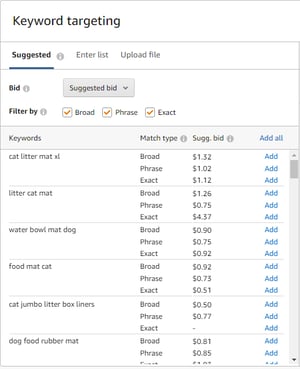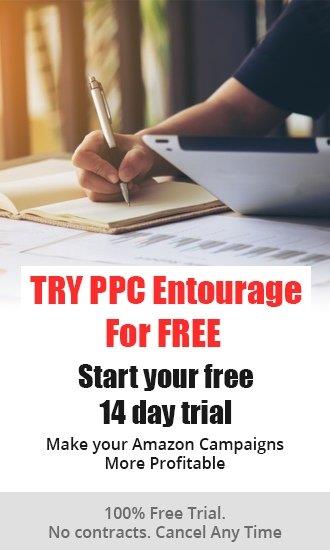Today, we’re going back to basics and discussing targeting selection best practices. We’ll be reviewing Amazon’s guidelines, and highlighting some areas that sometimes are forgotten or overlooked.
To start, let’s straighten out some of the confusion as it relates to vernacular.
Amazon’s Explanation of Targeting:
“Targeting uses keywords and products to help your ads appear in search and detail pages.”
This caused some early confusion when Amazon rolled out Product Targeting, so here is an easy way to break it down:
- Anything that you can bid on is a target.
- Targets connect you to customer search terms and, in essence, tell Amazon what it is you’d like to compete for within your advertising.
- Keywords are a type of target, as are Products and Categories. Since targeting Categories can be somewhat broad, you can further specify which aspects of the category you’d like to target via “refinements.”
The Right Amount, And Specificity, For Targets
Amazon’s guidelines state:
“If you don’t add enough keywords or if your keywords are too specific, your ads won’t receive enough impressions to hit your sales goals. If your keywords are too general, you might spend a lot on ad clicks without purchase.”
While this may seem like common sense, a problem I see come up often is sellers taking the “fewer keywords” advice a little too far, and not having enough keywords (or enough diversity) to get impressions. If a campaign only has one or two keywords and they are incredibly specific to your product, the amount of available traffic (customers searching in a way that might trigger a connection to your target) is limited.
Amazon recommends at least 25 keywords per campaign.
Recommended Keywords (The “Related” Tab)
Doing your own keyword research is of course a critical component to building successful campaigns, but don’t dismiss Amazon’s recommended targets too quickly.
Amazon’s suggestions are based on actual past shopping queries and ads for the products you’re advertising (or similar products). It is a misconception that they are just providing expensive keywords and calling it a day - their algorithm accesses an amount of data that you and I could only dream of, so take advantage of it.
 An important distinction for Recommended Keywords when building out Sponsored Brand campaigns is that the recommendations are based off of all of the products you’ve selected to appear on your landing page, not just the products shown on the ad.
An important distinction for Recommended Keywords when building out Sponsored Brand campaigns is that the recommendations are based off of all of the products you’ve selected to appear on your landing page, not just the products shown on the ad.
A final note on Recommended Keywords - their usefulness doesn’t end once the campaign is launched. Amazon continues to churn data for your campaign after you’ve selected your targets, which means you can return to the Related tab and find new keywords to target!
Search Term Report Gold
If you want to know what your customers are actually typing in when they click on your ads (and, more importantly, when they purchase your products), your Search Term Reports are the key. Amazon even goes as far as to recommend reviewing the report and bidding more aggressively on the keywords that match up with search terms that have the highest conversion rate.
I’ve been a long-time proponent of leveraging your Search Term Report, and one of the most important aspects of the advertising strategy I personally use and always recommend is what I call ACoS Scraping.
ACoS Scraping is, in essence, setting a certain threshold of performance for search terms, and then turning those search terms into targets. That threshold can be based on conversion rate as Amazon suggests, but you may have other metrics that are important to you that you want to include.
The distinction is that you won’t always have the search terms as a keyword already, as the search term may be the result of a broad or phrase match keyword. If you don’t already have the search term as a keyword, add it and bid aggressively on it. There are simple ways to do this so you don’t have to click through spreadsheets, like PPC Entourage’s Search Term Expansion tool.
If you do decide to go through the reports manually, don’t forget that there are separate reports for Sponsored Products, Sponsored Brands, and video ads.
Other Ways of Generating Targeting Research
Automatic campaigns are an easy and effective way to get loads of customer search terms and ASINs that could be potential targets.
Additionally, don’t forget about Category Targeting campaigns, which can generate ASINs for future use in Product Targeting campaigns.
When compiling a list of your possible targets, try to think as a customer would think. If you were buying your product and had no knowledge of Amazon’s algorithms, competitor research, etc., what would you type in? How would you describe what you’re looking for (something specific about the item, such as size or refills?). Remember to use brand related keywords as well, as you’ll want to appear immediately for shoppers looking specifically for you. If your budget allows for it (and your listing is strong enough), complimentary keywords are also a great way to generate visibility.
Final Notes on Best Practices
Every campaign should have a specific purpose. If your campaign doesn’t have a specific strategy behind it, selecting targets, bids, and budgets becomes impossible. If you don’t know why you’re setting up a campaign, don’t spend money on it.
Don’t let campaigns run unmonitored, even if you’re using automation. There are so many reasons to keep an eye on your campaigns, from missed opportunities to unnecessary spending and beyond. Always check in.
Additional Tips:
- There’s no longer any need to worry about pluralization variations of keywords (“headphone vs. headphones”)
- Don’t put the same keywords in three different match types in the same campaign with the same bid. Always stagger your bids.
And finally, the big one, directly from Amazon:
“Keywords don’t compete against each other...If you advertise the same product with the same keywords across multiple campaigns, your ads won’t perform better or worse.”
There’s been so much debate about this, but Amazon has made it abundantly clear that using similar keywords won’t drive up CPC.
I found tremendous value is picking apart Amazon’s guidelines and putting them into scenarios I felt were actionable. I hope that you found this overview of value as well. If you have any questions, or suggestions for topics you’d like me to discuss, please let me know by commenting below.










